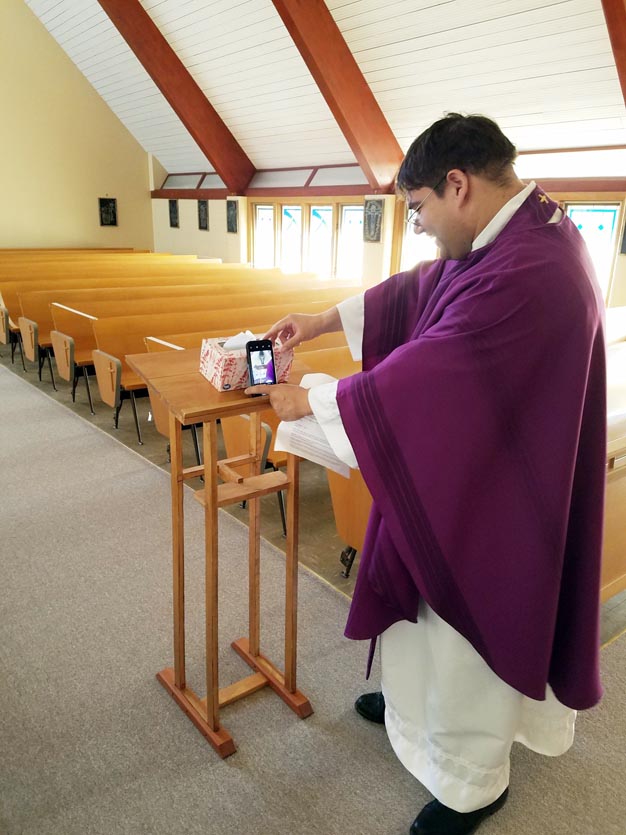By Barb Arland-Fye
The Catholic Messenger
Father Guillermo Trevino Jr. includes prayer intentions in his daily and weekend live-streamed Masses from individuals who post requests in the comment box on his Facebook page. Some of them or their loved ones have contracted the coronavirus. Some of them work for Tyson Foods, a meat-processing plant in Columbus Junction. More than 180 workers employed at the plant have tested positive for the coronavirus, USA Today reported April 17. The Columbus Junction plant closed April 6 because of the contagion and reopened on April 22 in a reduced capacity.

Father Guillermo Trevino Jr. talks with a parishioner as he sets up a smart phone at St. Bernadette Church in West Branch.
On April 19, the Iowa Department of Public Health announced that 261 or 67% of that day’s 389 additional cases of individuals who tested positive for the coronavirus could be attributed to surveillance testing of meat processing facilities.
Parishioners who work at Tyson Foods and in other front-line jobs in industries that require interaction with the public fear going to work at the risk of contracting the coronavirus themselves and exposing their families to the disease that harms them and their livelihoods, Father Trevino said.
Iowa Governor Kim Reynolds said Tyson Foods has been working with the Iowa Department of Public Health to get the company back on line. She affirmed a commitment to ensure the health and safety of workers while maintaining an important link in the food supply chain.
Calling for safety first
Advocates for workers on the front lines of food production and other essential jobs — including grocery store clerks, health care workers and postal workers — are insisting on front-line protection for these workers.
Rafael Morataya, executive director of the Center for Worker Justice in Iowa City, sent a letter April 13 to officials of West Liberty Foods in West Liberty, expressing concerns about the safety of that plant’s workers and calling for a proactive response.
“We and other community organizations in our network have heard from dozens of West Liberty Foods workers in the past week, who are expressing alarm for their safety and the safety of their co-workers and their families in this pandemic,” Morataya wrote. “Given the recent outbreaks in Columbus Junction, Tama, and Sioux Falls, it is clear that their concerns are reasonable and founded, and we join in support of their calls for the company to fully comply with OSHA guidance to protect these workers who are risking their health to feed our nation.”
The center calls for measures including:
• Actively encouraging all sick workers to stay home with pay, and eliminating barriers to using sick leave, such as doctor’s notes or discipline for absences.
• Allowing workers to take paid leave with no disciplinary consequences if they or their family members have health conditions that leave them vulnerable to COVID-19 infection or death.
• Allowing workers to take paid leave to care for children whose childcare or schools have closed as a result of COVID-19.
Other measures range from the standard social distancing requirements and staggered or longer break times to adequate sanitation supplies and easy and frequent access to restrooms.
The center expects the company’s leaders to also communicate the actions they take to reassure workers and community members. “Many factories and workplaces are adopting these policies,” Morataya wrote.
West Liberty Foods responds
Dan Waters, vice president and general counsel for West Liberty Foods, L.L.C., shared with The Catholic Messenger his April 14 response to Morataya. It details the steps the company has taken to protect employees after learning that six of the company’s 820 team members tested positive for the coronavirus.
“Upon learning of the positive cases, we immediately activated our COVID-19 response protocols to identify other team members who may have been at risk of exposure. The infected team members and the individuals working in proximity who were determined to be at moderate or high risk were sent home to self-quarantine with pay,” Waters wrote. “Last weekend, we closed the West Liberty plant for a four-day Easter holiday in order to carry out an intensive cleaning.”
Waters noted that “West Liberty Foods has adopted a comprehensive plan comprised of best practices to prevent, prepare for, and respond to a COVID-19 outbreak.” Read the details on The Catholic Messenger’s website at https://tinyurl.com/y8ssns82. The protocols include the measures Morataya requested in his letter. He told the Messenger April 19 that a worker told him 19 individuals have tested positive for the coronavirus.
The Catholic Messenger sought but did not receive a response from Tyson Foods about how the company planned to address the spread of coronavirus at the Columbus Junction plant. The company operates plants elsewhere in Iowa, including Waterloo and Council Bluffs.
Coalition petitions Iowa governor
The Center for Worker Justice also joined a coalition of more than 60 groups petitioning Gov. Reynolds and other Iowa leaders to direct Iowa’s businesses to take decisive steps to protect the state’s workforce from COVID-19. The coalition includes American Friends Service Committee of Iowa, Ethnic Minorities of Burma Advocacy, Refugee Alliance of Central Iowa, League of United Latin American Citizens, and Center for Worker Justice.
Thousands of Iowans “are risking their lives to provide food, health care, and other essential services while facing high risks of exposure to COVID-19 in their workplaces,” the groups’ statement says. “We know that existing racial and economic inequities in our communities are exacerbated by this pandemic, and temp workers, low wage workers, workers of color, and immigrant and refugee workers are at particular risk.”
The advocates say that “while workers have the right to report unsafe working conditions, many have reason to fear retaliation. Those brave enough to come forward too often find their reports falling on deaf ears.”
The statement calls for, among other things:
• Requiring all Iowa employers to follow federal CDC and OSHA guidance on steps to prevent workplace exposure.
• Offering hazard pay and/or bonuses to all essential workers.
• Ensuring all exposed workers access to medical care and emergency assistance, regardless of health insurance coverage or immigration status.
• Directing Iowa Workforce Development to provide workers’ compensation to workers who contract COVID-19 at their workplaces.
• Meeting with workers, self-employed, and independent contractors from essential industries to hear about the conditions they face and work with them to develop additional response plans specific to their industries.
Educating about worker rights
The University of Iowa Labor Center has created an online resource of basic fact sheets on workers’ rights. The resource is available in English and Spanish, at laborcenter.uiowa.edu/ resources-workers.
In his homily for the April 19 Spanish-language Mass, Father Trevino also sought to educate workers about their rights and the steps to take to protect themselves and their families. Some parishioners worry about repercussions if they speak up. “People are scared to talk, even to me,” said Father Trevino, who serves as parochial vicar of St. Patrick Parish in Iowa City, St. Bernadette Parish in West Branch and St. Joseph Parish in West Liberty. Some of his fellow priests and women religious have expressed similar concerns, based on ministry to immigrants in the Diocese of Davenport.











